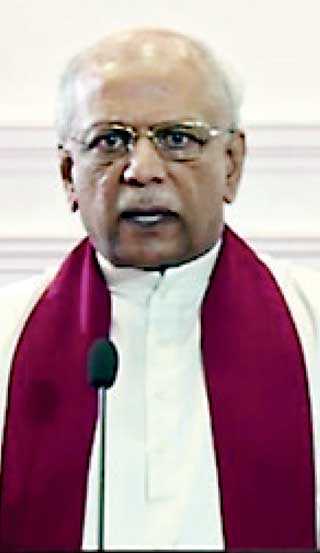Friday Feb 27, 2026
Friday Feb 27, 2026
Wednesday, 24 February 2021 00:00 - - {{hitsCtrl.values.hits}}
 |
| Foreign Minister Dinesh Gunewardena
|
In its debut performance at the current session of the UN Human Rights Council, the Government blamed the decision by the former regime to co-sponsor UNHRC resolution 30/1 for security failures
that led to the Easter Sunday bombings, and urged the 47-member body to vote down the resolution on Sri Lanka.
Addressing the High-Level Segment of the 46th Session of the UNHRC virtually yesterday (23), Foreign Minister Dinesh Gunewardena said the Government of President Maithripala Sirisena and Prime Minister Ranil Wickremesinghe had co-sponsored resolution 30/1 which was “against” Sri Lanka and made commitments that were undeliverable and not in conformity with the Constitution of Sri Lanka.
“This led to the compromising of national security to a point of reviving terrorist acts on Easter Sunday 2019, causing the deaths of hundreds,” the Foreign Minister claimed.
A core group of UN member states has announced it will bring a resolution on Sri Lanka, to push the Government to pursue post-war justice and reconciliation at the end of the 46th Session.
Urging the Council to “hold the scales even” and reject the resolution on Sri Lanka that will be floated next month, Minister Gunewardena said member states should decide whether the country warranted the urgent attention of the global human rights body.
The resources and time of the Council utilised on Sri Lanka was “unwarranted” and sent a poor signal to countries of the global south, he added.
“The need of the hour, in the face of an unprecedented pandemic, is solidarity rather than rancour and acrimony arising from divisions within this council. We urge that this resolution be rejected by the Council and be brought to closure,” the Sri Lankan Foreign Minister said.
Criticising the report on Sri Lanka by the UN High Commissioner for Human Rights released in January, Gunewardena said it had been followed by an unprecedented propaganda campaign.
In her damning report to the Council, High Commissioner Bachelet issued an early warning that Sri Lanka was on the cusp of recurrence of human rights violations, pointing to rampant militarisation of government, discrimination against religious and ethnic minorities and reversals and obstruction of justice on cases the UN has called ‘emblematic’ of impunity in Sri Lanka. The Government of Sri Lanka rejected the report and issued a strong objection to a social media campaign summarising the report released by Bachelet’s Office.
The Foreign Minister said that following the defeat of the LTTE – the only terrorist organisation in the world that killed two world leaders – “hegemonic forces” had colluded against Sri Lanka to bring an unsubstantiated resolution in 2009, which had been defeated by the support of “friendly nations”.
Those friends were still standing by Sri Lanka today, Gunewardena told the Council. Further resolutions adopted by the Council were “purely political” in motive, he added.
“In each instance Sri Lanka presented the procedural improprieties, and how such processes could set a dangerous precedent affecting all member states of the United Nations.”
Gunewardena expressed regret that despite his government’s spirit of cooperation with the UNHRC and its mechanisms, elements working against Sri Lanka intend to table another country-specific resolution based on Bachelet’s report.
“This rejected report by Sri Lanka has unjustifiably broadened its scope and mandate further, incorporating many issues of governance and matters that are essentially domestic in any self-respecting, sovereign country,” he charged.
“Particularly at a time when legislation is enacted by some countries to protect their soldiers from prosecution in military operations carried out overseas, only points to duplicity and the hypocritical nature of their motives. This cannot but result in a significant loss of morale among countries engaged in the struggle against terrorism.”
High Commissioner Bachelet will present her oral report on Sri Lanka today, followed by an interactive dialogue on her findings and assessments on the country’s human rights situation.